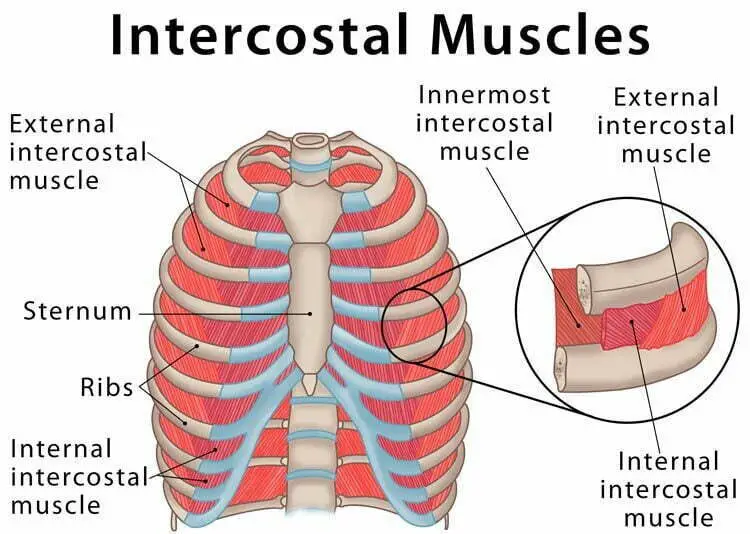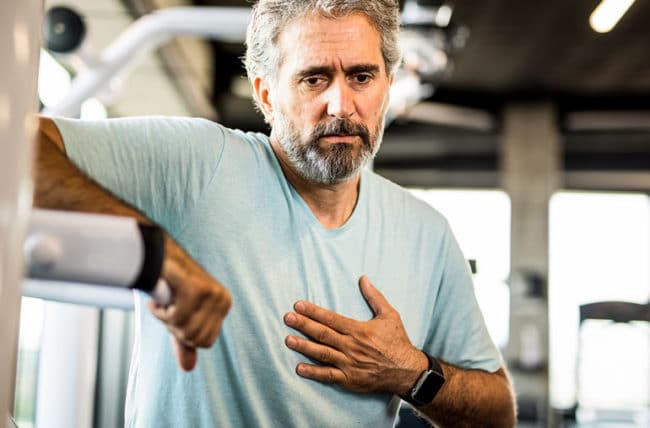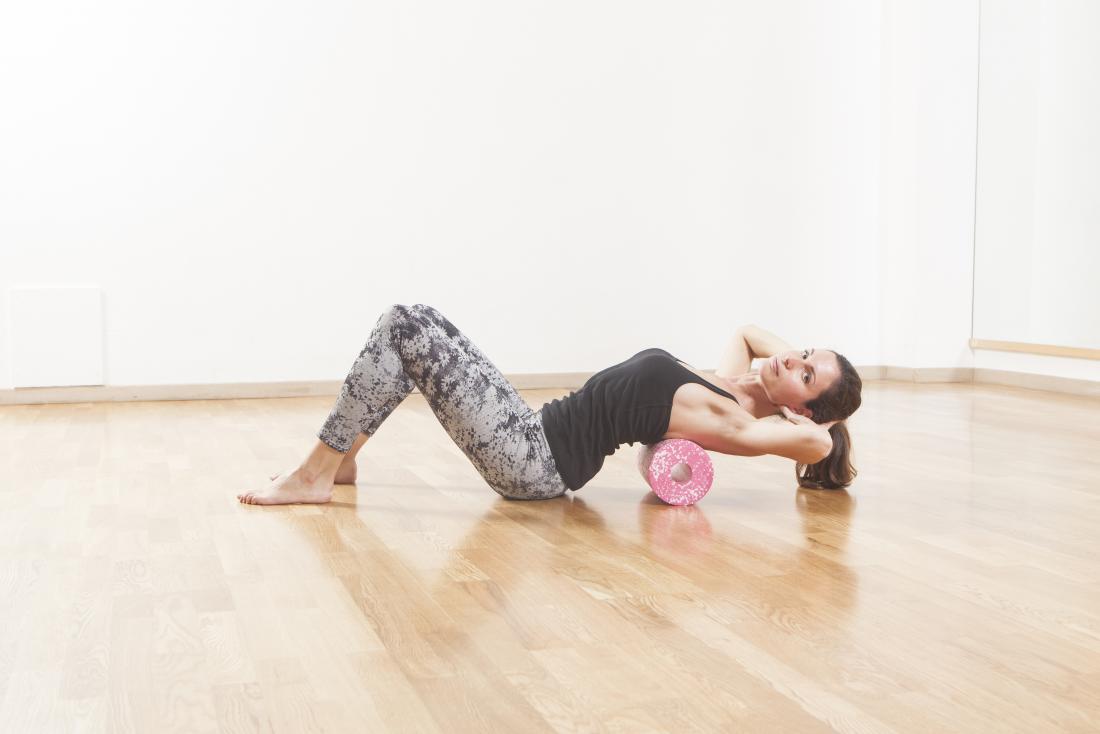Table of Contents
Intercostal Muscle Strain
Intercostal muscle strain is an injury that affects the muscles present between two or more ribs. These muscles have different layers that are adhered to the ribs which help build your chest wall and assist in breathing.
When these muscles are strained, stretched too far, or twisted, they may tear thus leading to Intercostal Muscle Strain. Intercostal muscles help to stabilize your body and help in breathing and there are 3 layers of these muscles- Innermost intercostals, external intercostals, and internal intercostals.
Having Intercostal Muscle Strain is a common cause of chest pain and about 21 to 49% of musculoskeletal chest pain is associated with intercostal muscles. You might strain or pull these muscles in several ways. Pain will either start from gradually repetitive motion or sudden injuries.
This article helps you examine some signs of Intercostal Muscle Strain and treatments possible.
Signs and symptoms of Intercostal Muscle Strain

The signs and symptoms of an Intercostal Muscle Strain may differ slightly based on the cause. However, some common symptoms include the following:
- Having a sharp rib and upper back pain.
- Having sudden and severe pain in the chest is particularly caused by a blow to the back or chest.
- The pain worsens gradually after performing repetitive movements such as swimming, rowing, or some other physical workouts.
- Tension and stiffness within the muscles causing pain in the upper back.
- The muscles become rigid when you twist or bend your upper body.
- Worsening pain when you sneeze, breath deeply, or cough.
- Intercostal muscles spasms.
- The areas between your ribs become tender.
Intercostal muscle strain vs other pains in the upper body
Your upper back is rarely injured because it is comparatively immobile. If there is a pin in this area, it often arises from a poor posture for the long term. It may also be due to some serious injuries that have exhausted the sturdiness of your upper spine like a bad car accident injury.
Pain as a result of injuries in the upper back is usually as sharp as a burning sensation in a single spot. The pain further may spread to your neck, shoulders, or other nearby body parts. It may come and go from time to time.
Intercostal Muscle Strain is usually a result of some specific events like injury or overexertion. In contrast to this, the initial cause of the discomfort and pain from lung disorders like pneumonia is hard to pinpoint.
In specific areas within your body where discomfort can be located like between the ribs, it indicates that the pain is arising from the upper back or lungs. Lung pain is generally sharp pain that spreads outwards.
When the ribs get fractured, the pain becomes much worse and severe than Intercostal Muscle Strain pain. Here are a few symptoms that indicate rib fracture and not Intercostal Muscle Strain:
- Not able to breathe properly.
- A stabbing sensation or protrusion in your rib areas.
- The area around your ribs is hard to touch.
Know that fractured ribs require immediate attention because it is a medical emergency that one needs to take care of. If you witness any of the symptoms given here, visit a doctor immediately.
Common Causes Of Intercostal Muscle Strain

It is said that a direct blow to your rib cage may be a cause of Intercostal Muscle Strain. A routine activity cannot usually cause Intercostal Muscle Strain, there may be some exceptions whatsoever. These strains mostly occur due to overexertion of the muscles and injuries within.
Some common causes may include the following:
- A direct blow to your Ribcages such as from a car accident or a fall.
- An impactful blow from certain contact sports like football or hockey where injuries are more likely to occur.
- Twisting your torse beyond the normal range of motion it can handle.
- Twisting when lifting heavyweights.
- Forceful twisting such as in tennis or golf.
- Twisting from a specific dance position or yoga postures.
- Reaching overhead when painting a ceiling.
- Lifting heavy objects about your shoulder height.
- Prolong overhead reaching
- Doing forceful movements repetitively such as playing and hitting a tennis ball.
Increasing your physical activities suddenly can also be the reason causing intercostal muscle strain. This is seen particularly when the muscles have already weakened due to poor posture and lack of exercise.
When you must visit a doctor
The time to visit a doctor for Intercostal Muscle Strain totally depends upon how serious the injury has become. A mild injury might result in low-level stiffness and pain that goes away within few days.
It is advised to visit a doctor if the pain becomes severe over time or lasts for more than some days or interferes with your daily activities and sleep. If you sense a traumatic injury such as an automobile accident or a fall that later causes breathing difficulties, immediate attention and medical help is needed.
Diagnosis of Intercostal Muscle Strain
Diagnosing Intercostal Muscle Strain involves your physical examination. The diagnosis aims to check for any limitations in your movement and assess areas that are a bit tender. The doctor will also have a word with you about sports involvements and recent injures that may have contributed to muscle strain.
MRI scans or X-rays are usually used to determine if there are internal injuries like fractured ribs or not.
Treatments

Home treatments are amazing and the only thing you need when the Intercostal Muscle Strain is not severe and all the symptoms are mild. Home treatment options include the following:
1. Hold and cold packs
- You can apply a cold pack or an ice pack followed by heat therapies. This alternative treatment can relieve pain from injuries. Heat therapies include taking a warm bath, adhesive heat wraps, heating pads, etc. You can easily purchase them online or get them from the nearest stores.
- Limiting physical activities and taking enough rest for few days will allow the muscles to recover.
- Taking medications for pain helps reducing pain and swelling. Some pain medications can be taken over the counter like ibuprofen and acetaminophen while some need prescriptions.
- Splinting the area is you cannot breathe and it is painful by holding a pillow against your injured muscles. However, breathing difficulties require medical attention immediately. Do not wait for home remedies to work in such cases.
In addition to all such home remedies, doctors might order the following:
- Muscles relaxants in case of sevre pain and muscle spamss.
- Physical therapies or PT.
- Injection of corticosteroids and lidocaine to reduce swelling and pain if all other treatments failed to show effects.
2. Breathing exercises
Breathing when you have Intercostal Muscle Strain can be painful, but taking shallow breathes instead of deep breaths can lead to severe infections. Deep breathing excises can be a form of medication to treat spasms ad reduce stress.
Try to do these exercises a few minutes a day for example:
- Hold any pillow again injures muscles.
- Breathe in every very and deeply.
- Hold your breath a few seconds
- Breathe out slowly.
- repeat the same 10 times.
Once you visit your doctor regarding pain, they may send you a spirometer. This is a plastic tool that gives a visual clue on how deeply one should breathe when having pain.
3. Physical therapy
PT or physical therapy might involve various stretches for stretching your intercostal muscles along with deep breathing exercises, and foam roller stretches. If the breathing becomes difficult or highly painful, deep breathing exercises are suggested by the doctors. Long-shallow breathing might lead to complications like pneumonia.
A person having Intercostal Muscle Strain should not go for stretching exercises unless a physical therapist is there to supervise you or other healthcare providers are present to guide you no your form. You don’t want to worsen the condition by causing much pain.
Stretching should be immediately stopped if the pain increases or any symptoms of Intercostal Muscle Strain become worse.
4. Epsom Salt Rocks
As a part of what therapies in the treatment, you may want to take a warm bath using Epsom salts. You will find them in local drugstores or online. Simple add nearly 2 cups of this salt to your bath and soak for 10 to 15 minutes.
The dissolved minerals in this water bath will be absorbed by your skin and will increase the level of magnesium in your blood. Magnesium is an important mineral for the functioning of your muscles. Although a very small amount of magnesium might not work the best for you it is better than just taking a normal bath.
Grading of muscle strains
As per the severity of injuries, muscle strains are divides into three grades. these are:
- Grade one- mild strains with less than 5% of muscle fibers affected and damaged cause minimal loss of motion. These injuries may take 2-3 weeks for healing completely.
- Grade two- More extensive muscle fiber damage but not rupturing of muscles completely falls under this category. You will have a loss of motion significantly and require 2 to 3 months to completely heal.
- Grade three- Tis involves rupturing of msucles completely and injuries may even need surgeries.
Prevention and outlook
Mild Intercostal Muscle Strain does not require various treatments and it may heal within a few days. Moderate strains might take nearly 3 to 7 weeks to heal whereas severe strains which involve complete tears of the muscles will take a longer time to heal.
In general, Intercostal Muscle Strain will heal within 6 weeks. Preventing future injuries involves stretching and warming up before performing strenuous workouts. It is highly important not to overdo it when it comes to working out with weights and taking part in sports events.
Keeping your muscles strong is also useful in preventing muscle spasms in the future.


